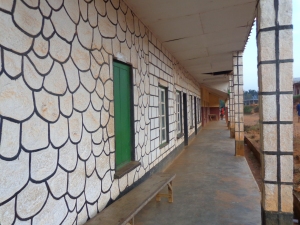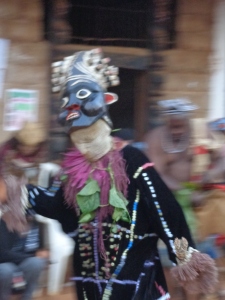10-Dec-2012
So it’s official. I am officially a Peace Corps Volunteer (PCV). I know many of you are thinking, wait, haven’t you been a PCV this entire time? Nope. I was just a lowly Peace Corps Trainee (PCT). Well, I have taken my oath and I am a PCV for real.
Our swearing-in ceremony was also the 50th anniversary of Peace Corps in Cameroon, so it was kind of a big deal. It was held at the Palais des Congrès in Yaoundé. We had all decided that for such a special occasion, it would be necessary for all of us to sport the same pagne. A blue and brown pagne was chosen several weeks into training, and it was our responsibility to design our dress/shirt and take it to a tailor. I think we all looked very nice; it was like a graduation gown! One of the trainees in our stage made a video of photos and interviews in which some of the other trainees talked about why they joined the Peace Corps and their experiences so far. Another trainee (Santina) was chosen to give a speech in French about training and the things we have learned, both in class and in our homestays. Later, all 53 almost-volunteers sang Michael Jackson’s “Man in the Mirror” with a Cameroonian choir from Yaoundé. Apparently it was a big hit, even amongst the high-up Cameroonian officials! If you do not know that song, you should definitely look it up as soon as possible because the message is very moving. One of my fellow health trainees who envisioned the whole performance thought the song lyrics were fitting of the Peace Corps experience.

New health education Peace Corps Volunteers at the Palais des Congres
When the ceremony was over, we took some group photos, and then walked downstairs to the lobby for the fair, which included tables displaying the work that PCVs from different regions were doing. Then Chantal Biya showed up. Chantal Biya is known in Cameroon for 1) being the first lady and 2) having a lot of hair on her head. She walked around all of the tables with the Peace Corps Country Director, Jackie Sesonga, smiling and nodding politely. Members of her charity, the Chantal Biya Foundation, were there, all wearing the same pagne as well.
Next, we enjoyed a buffet lunch, and I mean COMPLETELY DELIGHTED IN. Food in Yaoundé (in comparison to the rest of Cameroon) is just better. We were each allowed to invite one member from our host families. I invited my host mother, who wore this bright purple dress and had blue hair extensions. We shared a lunch table with Jackie, the country director, and her husband. The homestay coordinator Monique had chosen Kara, another health trainee (now volunteer!) to thank the host families for all that they had shared with us, while Vanessa’s host mother thanked the trainees. After lunch, we walked around the fair and then said our goodbyes to the other PCVs, who would be heading back to their respective regions or completing their service (COS) and moving back to the U.S. or elsewhere.
We celebrated Thanksgiving the next day in Bokito and invited the new environment (agro) and youth development (YD) volunteers to join us. We did a potluck at the “restaurant” of the host family of my friend Emily; we ate lunch there every day. The other Emily in our program and I cooked black beans at her house as our contribution, and then she carried the pot on her head for the 20-minute walk, like a true Cameroonian woman. There were three kinds of mashed potatoes, stuffing, monkey bread, chili, and pumpkin soup, among other things.
The following day, I broke my 4-week, 4-day no-crying streak as we were loading the buses to leave Bafia for our posts. I began to cry when the first two buses to depart began to board. The people headed to Yaoundé were the first to leave. The volunteers posted in the Grand North (Adamaoua, North, Far North) would take an overnight train that evening, arriving in Ngaounderé, Adamaoua the following morning. Next, a bus for the Southwest left, and a bus for the West and Southwest followed shortly after. The Northwest volunteers were the last to leave Bafia. On our bus to Bamenda, the regional capital of the Northwest, we were spoiled with plenty of room to move around and nap. We may never have such a luxury again, as long-distance travel in Cameroon is mainly by bush taxi, carrying at least eight people in a small sedan meant for five. Ten of us were on board; nine of us would be remaining in the Northwest, while one was headed to the northern part of the Southwest. We arrived in Bamenda, the regional capital of the Northwest, in about five or six hours. We met up with other PCVs at the case (the name for the house in each regional capital where Peace Corps is based and where there are beds – 500 FCFA per night), and then went to get shawarma. We stayed at a hotel that night (with hot showers!) and I roomed with my agro friend, Alina.
The next day, we went to Pres Café, a Western café for breakfast. The meal was one of the best I have had in Cameroon. That afternoon, we de-bowed (no idea how to spell it) a car for four of us and headed to Kumbo. The drive was three hours and I was squished in the back of the sedan with Shannon, a YD volunteer. In the front, Ben (Community Economic Development (CED)) and Lexie (IT Education) shared the passenger seat. We spent the weekend in Kumbo and I set up my bank account on Monday. I bought a mattress and gas stove and already started to feel like I was running out of money. Ben and I left on Tuesday to head to Misaje. We arrived at my house (it’s pink!) four hours later, had lunch with Alissa, a health volunteer who helped with our training, and then turned back to Nkambe, where I bought a few more things for my house. We went to Alissa’s village of Fonfuka for World AIDS Day (December 1st) and it was awesome to see a health volunteer in action. She trained moto drivers to be peer educators and give lectures and demonstrations. She also has a health club at the technical high school. The posters, essays, and poems that students in her village created with the theme of AIDS were phenomenal. Fonfuka is very small and barely has cell phone service, let alone internet. The poster that won the contest that we judged depicted an army of white blood cells fighting off HIV, and included captions detailing how HIV affects the body. The essay that won talked about admission into a university of AIDS. These students are really creative and talented!

Misaje Medicalised Health Center, November 29, 2012
Setting up a new post has already proved challenging. My house is essentially empty and I have been sleeping on my mattress on the floor, with no place to sit. A carpenter in my village recently finished building a bed frame, as well as a gas cupboard for my stove to sit upon. For now, I must save money if I wish to travel for the holidays, so my house may not look like a home for several months.
The chief of the health center and pharmacist have been very helpful so far in getting me settled in. I meet someone new and different every day. I have visited the bible translating center in Misaje, where I met some missionaries, American and Dutch, some of whom have been here for more than twenty years. It is interesting to learn about their perspectives of Cameroon and how they have adjusted to a Cameroonian lifestyle. A former English teacher has been teaching me Pidgin, and I have watched the meningitis vaccinations be successfully administered to hundreds of people in my village.
I will not have internet for a while (and there is no electricity in my village), but hopefully there will be more to come on this blog in a few weeks!


